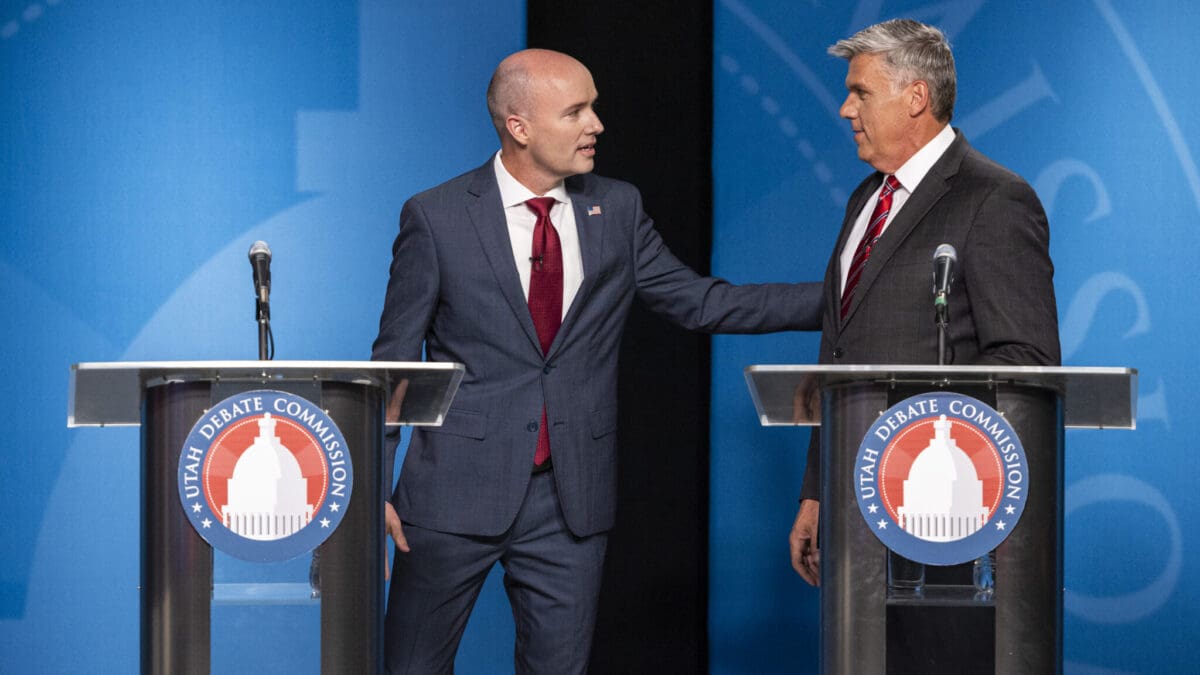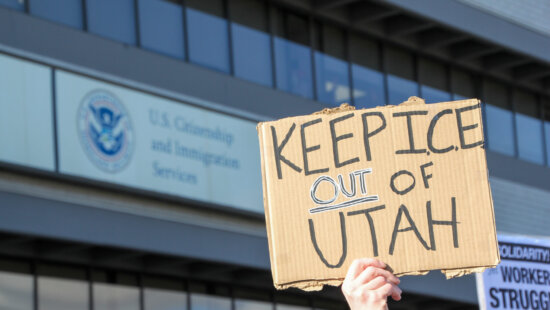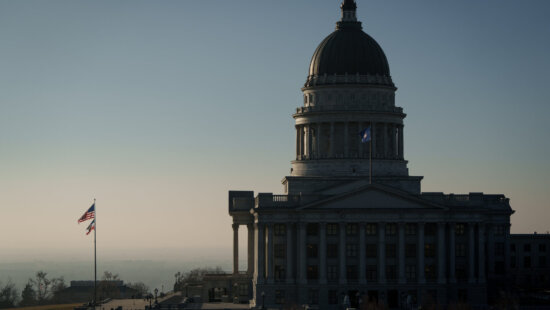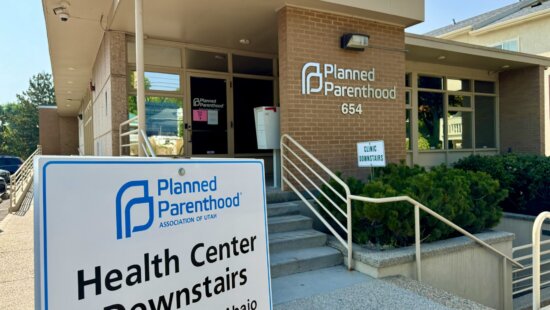Politics
Primary election day in Utah: The state of play

Incumbent Gov. Spencer Cox, left, talks with Utah Rep. Phil Lyman before Utah’s gubernatorial GOP primary debate held at the Eccles Broadcast Center in Salt Lake City on Tuesday, June 11, 2024. Photo: Pool photo by Isaac Hale/Deseret News
Cox, Curtis leading in poll released day before primary amid final-week drama
By: Katie McKellar, Utah News Dispatch
The primary is here — a crucial election that often decides many of Republican-controlled Utah’s seats.
There’s been no shortage of last-ditch drama in the weeks leading up to today, from Utah Gov. Spencer Cox’s challenger Rep. Phil Lyman’s campaign attacking state election officials over signature gathering verification, to a final-week endorsement from former President Donald Trump to Rep. Celeste Maloy, challenged by Sen. Mike Lee-backed Colby Jenkins.
Today’s primary will be a test for Utah. The state has a complex past with Trump, with whom many state and congressional Republican challengers have aligned themselves this election. If MAGA Republicans prevail, it would signal a dramatic sea change for the red state which has largely favored tempered, policy-based politics over brash, populist rhetoric.
If history can predict the future, it would tell us these MAGA Republicans — many who won at convention, but still face primary contests because of Utah’s dual path to the primary ballot via signature gathering — have a steep hill to victory. Utah GOP delegates have a track record of rejecting Republican incumbents who go on to win handily in the primary.
It’s always possible this year could be different, but recent polls also signal established Utah Republicans like incumbent Cox and Rep. John Curtis have leads over their MAGA competitors.
Here’s the state of play in Utah’s high-profile primary elections, and what you need to know to make sure your vote counts before polls close tonight at 8 p.m.:
Final-week drama in Utah governor’s race
Utah’s gubernatorial contest between Cox and Lyman is among the state’s most heated primary races.
A new poll released Monday by Noble Predictive Insights showed Cox is leading Lyman by 13 points (55% to 42%). The poll of 432 likely Republican primary voters in Utah was conducted from June 20-21, and has a margin of error of plus or minus 4.71 percentage points.
The governor’s race highlights a sharp “dividing line” among Utah Republicans: support for Trump, the poll report states. The poll, which asked voters to state whether they support either Trump or the Republican Party more, shows Lyman leads Cox by 61 points among “Trump-first” Republicans (80% to 19%), while Cox leads Lyman by 42 points among party loyalists (70% to 28%).
This race has been one of opposites among two Republicans. While Cox parades his National Association of Governor’s “Disagree Better” campaign, meant to discourage hyperpartisanship and polarization, Lyman (at least online, though not in an in-person debate earlier this month) has embraced a bulldog style campaign that constantly attacks Cox, accusing him in various ways of not being a true conservative.
Cox says he’s a governor who tries to represent everyone in the state of Utah while also supporting conservative policies. Lyman has catered more to hard-line MAGA Republicans, pledging to more aggressively take on the federal government.
Lyman has fully aligned himself with Trump, while Cox has been critical of the former president and the state of national politics as a whole. Cox has said he hasn’t voted for Trump or other major presidential candidates since Mitt Romney’s campaign in 2012, opting for write-in candidates instead.
This week, Lyman’s campaign ramped up the rhetoric around the election itself when it posted a video on social media with Lyman’s running mate, Natalie Clawson, accusing the lieutenant governor’s office of lacking “transparency” for not releasing all of the signatures Cox and other candidates submitted to qualify for the ballot.
For candidate signature gathering petitions, Utah law requires election officials to redact names from signature packets of voters who have chosen to classify their records as private.
Lyman’s campaign implied it needed to see all of the signatures (even though that would go against state law), because of an “investigation” regarding signature gathering for a different race in Washington County. Sen. Don Ipson, R-St. George, ended up qualifying for the primary at convention and not through signature gathering, but Lyman’s campaign has pointed to the case because the company that collected signatures for Ipson, Gathering Inc., also gathered signatures for Cox and other candidates.
Irregularities in Ipson’s signature gathering are being investigated, Washington County Attorney Eric Clarke told the Deseret News, but he also said there was no evidence of a candidate or the company acting inappropriately.
Ipson hired Gathering Inc. to help him get the 2,000 signatures from registered Republicans needed to qualify for the ballot. However, the Washington County auditor determined 600 were invalid, KSL NewsRadio reported, and Ipson said he got a refund. Clarke told the station that the high number of signatures deemed invalid prompted his office to investigate, but there was “definitely no evidence of wrongdoing by any candidate.”
Tanner Leatham, CEO of Gather Inc., told KSL NewsRadio the errors with Ipson’s campaign came from contractors who didn’t follow the company’s rules or use the correct software, which shows where registered Republican voters live.
Meanwhile, while Lyman’s campaign has criticized the lieutenant governor’s office, a separate office verified the Cox campaign’s candidate signatures, along with petitions for 31 other candidates.
Addressing “questions raised,” Davis County Clerk Brian McKenzie issued a statement Friday affirming “each signature was reviewed by trained election workers and either validated or rejected in accordance with the requirements” set by Utah Law, and that each candidate who qualified submitted a sufficient number of valid signatures. McKenzie’s statement also outlined the process for verifying signatures.
It’s not the first time Lyman’s campaign has raised questions about elections. In a media scrum after debating Cox earlier this month, Lyman wouldn’t say he’d accept the results of the election — but that “I will be checking the results of the election,” regardless of if he wins or loses, calling for more “transparency.”
Refusing to accept election results comes from the Trump playbook, as he and his allies continue to sow doubts about election legitimacy. In states across the U.S., no evidence supports Trump’s continued claims of widespread voter fraud that influenced the 2020 election.

Curtis leading in race for outgoing Sen. Mitt Romney’s Senate seat
Another race that will be a test for Trump’s influence on Utah politics is the Republican contest between Utah’s current 3rd District Rep. John Curtis, Riverton Mayor Trent Staggs, businessman Jason Walton and former House Speaker Brad Wilson.
The poll released Monday by Noble Predictive Insights also showed Curtis is the front-runner in this race, leading with 48% of likely Utah primary voters to Staggs’ 28%. Wilson had 9%, Walton had 6%, while 7% said they didn’t vote and 2% were undecided, according to the poll.
The poll comes after Staggs, endorsed by Trump, won the Utah Republican Party’s nominating convention with over 69% of the vote to Curtis’ 30.26% (Curtis and the other candidates qualified via signature gathering).
Staggs’ Trump endorsement and his convention win, however, “seem to be overcast by Curtis’ appeal and campaign resources,” Noble Predictive Insights wrote. Curtis has dramatically outraised Staggs over the last two months, The Salt Lake Tribune reported. Plus, national political action committees have spent over $2 million in the last week on a flood of attack ads against Staggs, the Deseret News reported.
If the poll reflects actual primary results, it would indicate that Trump continues to have a fraught standing among many voters in Utah.
“In most Republican primaries, Trump’s endorsement essentially guarantees victory,” David Byler, chief of research for Noble Predictive Insights, said about Monday’s poll. “But in Utah — a uniquely conservative, yet Trump-skeptical state — the situation is different. Trump’s endorsement helps, but it’s not a golden ticket. A good candidate with the right positioning — like Curtis — can build a lead without Trump’s stamp of approval.”
Among “Trump first” Republicans, 55% support Staggs, while only 22% support Curtis, the poll shows. However, among those who put the party first, Curtis leads with 60% to Staggs’ 18%.
In Utah, however, Byler also said it’s “becoming increasingly tough to oppose Trump,” pointing to Romney’s decision to retire.
“But, if you can meld the anti-Trump faction in with some pro-Trump voters — and lean on GOP women — you can create a solid coalition,” he said. “A lot can happen in the run-up to a primary — anything from a surge for the Trump-ian candidates to a bigger-than-expected landslide for the leaders is still on the table.”

Other congressional races
2nd Congressional District: Perhaps the next race to see the most drama has been the contest between Rep. Celeste Maloy and her Republican challenger, Colby Jenkins.
In a twist days before the state Republican nominating convention, Utah Sen. Mike Lee snubbed Maloy and endorsed Jenkins. However, both candidates advanced to the primary ballot with a split vote (Jenkins got 57% from delegates while Maloy got 43%).
Then came another twist. A week ago, Trump gave his “complete and total endorsement” to Maloy in a post on Truth Social.
Lacking polling, it’s unclear how close the race between Maloy and Jenkins could be — but it could be a test for the power of endorsements, or if they matter at all.
In a debate earlier this month, Jenkins and Maloy argued over how to “compromise” in Congress. Jenkins heavily criticized Maloy’s votes on a sweeping spending bill that funded several federal departments and agencies. He called her nods to the bill “surrendering” and an example of how the slim Republican majority “becomes nothing.” Maloy defended her votes, arguing that it was the most fiscally responsible option. She also highlighted that whenever there’s a narrow margin, the ability to compromise is key.
3rd Congressional District: It’s a crowded, five-way Republican contest between Sen. Mike Kennedy, Utah Auditor John Dougall, Case Lawrence, Roosevelt Mayor J.R. Bird and former Utah County Republican Party Chairman Stewart Peay.
Kennedy, R-Alpine, who lost to Romney in 2018, was recently endorsed by Lee, a Trump supporter.
In a debate earlier this month, the five Republicans jockeyed to differentiate themselves, with some contrasts surfacing when it came to supporting Ukraine or tackling the national deficit.
The most difficult task for voters in this race is to choose among fairly similar Republicans, though at least one candidate stands out for choosing to not embrace — but reject — MAGA politics. Dougall has campaigned on promoting “mainstream principles, not MAGA antics.”
1st Congressional District: Incumbent Rep. Blake Moore is being challenged by South Ogden electrician Paul Miller.
There’s not nearly been as much drama in this race, but in a debate earlier this month the two candidates illustrated a divide between rhetoric versus reality, spending and deal breakers in the U.S. House.
Moore, who has been in Congress since 2021, spoke about forging relationships with counterparts and reaching compromises in a slim Republican majority. Miller, on the other hand, criticized Moore for voting for spending bills that “fund Biden’s agenda.”
Like the debate between Maloy and Jenkins, Moore and Miller’s race displays a divide among Republicans over whether members of Congress should compromise or negotiate with Democrats.
Make your vote count
If you had planned to vote by mail, Monday was the last day to postmark your ballot. However, you can still drop your by-mail ballot off at secure ballot drop boxes. Visit your county clerk’s website for information on where those ballot drop boxes are located.
If you plan to vote in person, you can do so at vote centers located throughout your county. Polls will be open until 8 p.m.
If you’re not registered to vote, it’s not too late, so long as you vote in person. Vote centers offer same-day voting registration. Be sure to bring two forms of identification (one to verify identity and one to provide proof of residence).
After polls close at 8 p.m., county clerks are expected to begin posting early election night results throughout the night. Depending on margins, some races may be called earlier than others.
Election results aren’t final until after counties’ canvass deadline on July 9, and the statewide canvass certifies the results on July 22.


















